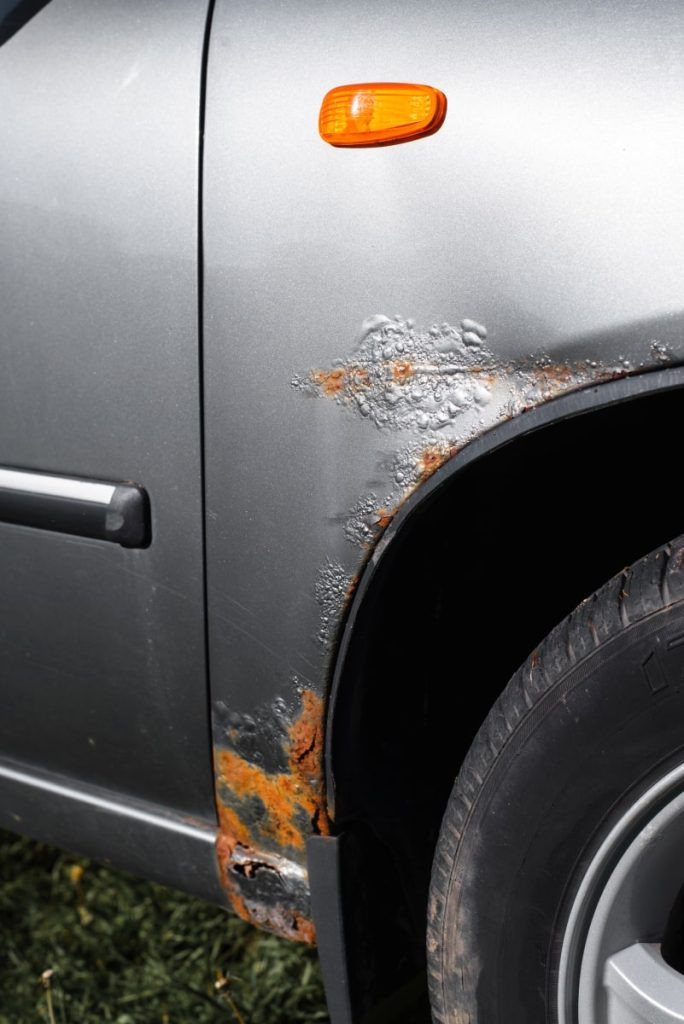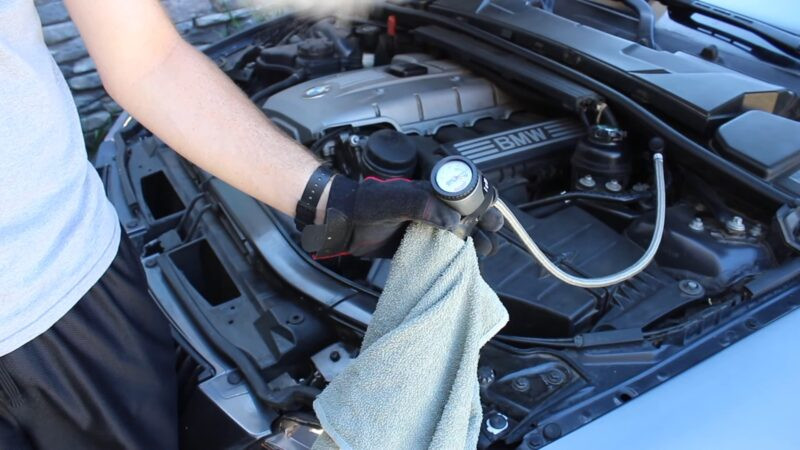How to Fix an Overcharged Car AC: Your Ultimate Guide
An overcharged car AC can lead to discomfort and potential damage to your vehicle’s air conditioning system. Understanding how to fix an overcharged car AC involves recognizing the symptoms, understanding the causes, and knowing the proper steps for resolution, ensuring your system operates efficiently and effectively. CARDIAGTECH.NET is here to provide you with expert insights and solutions for diagnosing and addressing AC overcharging, offering top-notch tools for accurate diagnosis and effective AC system maintenance.
1. Understanding How ACs Become Overcharged
The most common cause of an overcharged AC stems from adding too much refrigerant during a DIY recharge attempt. Novice car owners, eager to boost their AC’s cooling power, sometimes mistakenly believe that more refrigerant equals colder air, leading to overcharging, especially during warmer months. It’s crucial to understand that an AC system is designed to operate within a specific pressure range; exceeding this range can cause significant issues.
1.1 The Myth of More Refrigerant
Adding excessive refrigerant doesn’t enhance cooling; instead, it hinders the system’s ability to function correctly. An overcharged system struggles to convert the refrigerant from liquid to gas, which is essential for cooling. This inefficiency results in warm air blowing from your vents, defeating the purpose of recharging the AC in the first place.
1.2 Faulty Gauges and Coolant Cans
The unreliability of gauges included with over-the-counter coolant cans further exacerbates the issue. These gauges often provide inaccurate readings, making it difficult to determine the precise amount of refrigerant being added. As a result, even well-intentioned DIY attempts can lead to an overcharged system, emphasizing the need for professional servicing or reliable tools.
2. Identifying Signs and Symptoms of an Overcharged Car AC
Recognizing the signs of an overcharged car AC early can save you from costly repairs. Here’s what to look for:
2.1 Inadequate Cooling Performance
One of the most noticeable symptoms is a decrease in cooling efficiency. The AC may blow lukewarm or even hot air instead of the cool air you expect. This happens because the excess refrigerant disrupts the cooling cycle, preventing the system from effectively dissipating heat. A properly functioning AC system should start delivering cool air within a couple of minutes of being turned on, according to automotive experts.
2.2 Compressor Noises and Issues
The compressor plays a vital role in the AC system by circulating refrigerant. When the system is overcharged, the compressor has to work harder to compress the excess refrigerant, leading to unusual noises such as grinding or rattling. Over time, this increased strain can cause the compressor to fail, necessitating expensive repairs.
2.3 High-Pressure Readings
AC systems have pressure gauges to indicate the amount of refrigerant in the system. An overcharged system will exhibit higher-than-normal pressure readings, which can be observed using a manifold gauge set. Monitoring these readings is essential for diagnosing an overcharged AC and preventing further damage.
2.4 Engine Performance Decline
An overcharged AC system can place a significant load on your car’s engine. The additional strain required to power the compressor can result in decreased fuel efficiency and sluggish acceleration. If you notice a decline in your car’s performance alongside AC issues, an overcharged system could be the culprit.
3. Step-by-Step Guide: How to Fix an Overcharged Car AC
When dealing with an overcharged car AC, the most effective solution involves removing the excess refrigerant to bring the system back to its optimal operating pressure. Due to the complexities and potential hazards involved, consulting a professional mechanic is highly recommended. However, understanding the process can help you make informed decisions and communicate effectively with your mechanic.
3.1 Seeking Professional Assistance
Engaging a qualified mechanic ensures that the excess refrigerant is safely and correctly removed from the system. Mechanics possess the necessary tools, such as refrigerant recovery machines, and the expertise to handle refrigerants without causing harm to the environment or risking personal safety. This is particularly important given the legal regulations surrounding the handling and disposal of refrigerants.
3.2 The Mechanic’s Approach
A mechanic typically connects a refrigerant recovery machine to both the high-pressure and low-pressure ports of the AC system. This machine extracts the refrigerant and measures the amount removed, allowing the mechanic to determine when the system reaches the correct pressure levels. The recovered refrigerant is then either recycled or properly disposed of, adhering to environmental regulations.
3.3 DIY Considerations (Proceed with Caution)
While professional service is the safest bet, some experienced individuals might consider a DIY approach. However, it’s essential to proceed with extreme caution and only if you have the necessary expertise and equipment. Venting refrigerant into the atmosphere is illegal and harmful to the environment.
Disclaimer: CARDIAGTECH.NET does not endorse or encourage DIY refrigerant removal due to the associated risks and legal implications.
3.4 Tools and Equipment Needed (For Informational Purposes Only)
If you’re considering a DIY approach (again, proceed with extreme caution), you’ll need the following:
- Manifold Gauge Set: To monitor the pressure in the AC system.
- Refrigerant Recovery Tank: To safely collect the removed refrigerant.
- Vacuum Pump: To evacuate the system after refrigerant removal.
- Safety Gear: Including gloves and eye protection to handle refrigerants safely.
3.5 Step-by-Step DIY Process (For Informational Purposes Only):
Warning: This is a simplified overview for informational purposes only. Actual procedures may vary depending on your vehicle’s make and model. Always consult a professional mechanic for guidance.
- Connect the Manifold Gauge Set: Attach the high-pressure and low-pressure lines to the corresponding ports on your AC system.
- Monitor Pressure Readings: Observe the pressure readings to determine the amount of excess refrigerant.
- Recover Refrigerant: Slowly release refrigerant into the recovery tank, monitoring the pressure gauges to ensure you don’t remove too much.
- Evacuate the System: Use a vacuum pump to remove any remaining air and moisture from the system.
- Recharge the System: Add the correct amount of refrigerant as specified in your vehicle’s manual.
- Verify Performance: Check the AC system’s cooling performance to ensure it’s functioning correctly.
3.6 Potential Risks and Complications
Attempting to fix an overcharged AC system without the proper knowledge and equipment can lead to several risks, including:
- Environmental Damage: Improper handling of refrigerants can release harmful chemicals into the atmosphere, contributing to climate change.
- Personal Injury: Refrigerants can cause frostbite and other injuries if not handled with care.
- System Damage: Incorrectly removing or adding refrigerant can damage the AC compressor and other components.
- Legal Consequences: Venting refrigerant into the atmosphere is illegal and can result in fines and penalties.
4. Understanding the Root Cause of an Overcharged AC
Identifying the cause of the overcharge is essential to prevent future issues. Common culprits include:
4.1 DIY Recharge Mistakes
As mentioned earlier, DIY recharge attempts gone wrong are a primary cause of overcharged AC systems. Inaccurate gauges, lack of experience, and insufficient knowledge about the vehicle’s AC system can all contribute to overcharging.
4.2 Faulty Components
In some cases, an overcharged AC may be a symptom of underlying issues within the system, such as a malfunctioning expansion valve or a blocked condenser. These problems can cause pressure imbalances and lead to overcharging.
4.3 Improper Servicing
Even professional mechanics can sometimes make mistakes when servicing AC systems. Overfilling the system with refrigerant or failing to properly diagnose underlying issues can result in an overcharged AC.
5. Prevention Strategies: Keeping Your AC in Optimal Condition
Preventing an overcharged AC is always preferable to dealing with the consequences. Here are some proactive steps you can take:
5.1 Regular Professional Maintenance
Schedule regular AC system inspections and servicing with a qualified mechanic. They can check refrigerant levels, identify potential issues, and ensure that your system is operating efficiently. Automotive experts recommend servicing your AC system at least once a year to maintain its performance and longevity.
5.2 Accurate Recharge Practices
If you choose to recharge your AC system yourself, invest in a high-quality manifold gauge set and follow the manufacturer’s instructions carefully. Avoid overfilling the system and always refer to your vehicle’s manual for the correct refrigerant capacity.
5.3 Addressing Leaks Promptly
AC systems can develop leaks over time, leading to refrigerant loss and decreased performance. Addressing leaks promptly can prevent the need for frequent recharges and reduce the risk of overcharging.
6. Choosing the Right Tools for AC Maintenance
Having the right tools is essential for effective AC maintenance and repair. CARDIAGTECH.NET offers a wide range of high-quality tools designed to help you diagnose and address AC system issues accurately.
6.1 Manifold Gauge Sets
A reliable manifold gauge set is crucial for monitoring pressure readings and diagnosing AC system problems. Look for a set with accurate gauges, durable construction, and compatibility with your vehicle’s refrigerant type.
6.2 Refrigerant Recovery Machines
For professional mechanics, a refrigerant recovery machine is an indispensable tool for safely and efficiently removing refrigerant from AC systems. Choose a machine with a high recovery rate, user-friendly interface, and compliance with environmental regulations.
6.3 Leak Detectors
Identifying leaks in your AC system can be challenging without the right tools. A refrigerant leak detector can help you pinpoint the source of leaks quickly and accurately, allowing you to address them promptly.
6.4 Vacuum Pumps
A vacuum pump is essential for evacuating air and moisture from the AC system after refrigerant removal. Look for a pump with a high vacuum rating and a durable construction to ensure reliable performance.
7. Why Professional AC Service is Worth the Investment
While DIY AC maintenance may seem appealing, the benefits of professional service often outweigh the costs. Here’s why:
7.1 Expertise and Experience
Professional mechanics have the knowledge and experience to accurately diagnose and address AC system problems. They can identify underlying issues that may not be apparent to the average car owner and recommend the most effective solutions.
7.2 Specialized Equipment
Mechanics have access to specialized equipment, such as refrigerant recovery machines and leak detectors, which are necessary for proper AC servicing. These tools allow them to perform tasks safely and efficiently, ensuring that your AC system is in optimal condition.
7.3 Environmental Responsibility
Professional mechanics are trained to handle refrigerants responsibly, preventing environmental damage and ensuring compliance with regulations. They can properly dispose of or recycle refrigerant, minimizing the impact on the planet.
7.4 Cost Savings in the Long Run
While professional AC service may involve an upfront cost, it can save you money in the long run by preventing costly repairs and extending the life of your AC system. Addressing issues early can prevent them from escalating into more significant problems.
8. Exploring the Laws and Regulations Surrounding Refrigerant Handling
Handling refrigerants is subject to strict laws and regulations designed to protect the environment and public health. Understanding these regulations is essential for both professional mechanics and DIY enthusiasts.
8.1 EPA Regulations
The Environmental Protection Agency (EPA) regulates the handling and disposal of refrigerants under Section 608 of the Clean Air Act. These regulations prohibit venting refrigerant into the atmosphere and require technicians to be certified in refrigerant handling practices.
8.2 Certification Requirements
Technicians who service AC systems must be certified under Section 608 of the Clean Air Act. Certification requires passing an exam that demonstrates knowledge of refrigerant handling procedures and environmental regulations.
8.3 Penalties for Violations
Violations of refrigerant handling regulations can result in significant fines and penalties. Venting refrigerant into the atmosphere can lead to fines of up to $44,539 per day per violation, according to the EPA.
9. The Financial Implications of Neglecting AC Maintenance
Neglecting AC maintenance can lead to a range of financial consequences, including:
9.1 Increased Fuel Consumption
An inefficient AC system can place additional strain on your car’s engine, resulting in increased fuel consumption. Addressing AC issues promptly can help you save money on gas.
9.2 Costly Repairs
Neglecting AC maintenance can lead to costly repairs, such as compressor replacement or system overhaul. Addressing issues early can prevent them from escalating into more significant problems.
9.3 Decreased Resale Value
A poorly maintained AC system can decrease your car’s resale value. Buyers are often wary of vehicles with AC problems, as they can be expensive to fix.
9.4 Environmental Fines
Improper refrigerant handling can result in environmental fines and penalties. Avoiding these fines requires following refrigerant handling regulations and seeking professional service.
10. CARDIAGTECH.NET: Your Partner in Automotive Solutions
At CARDIAGTECH.NET, we understand the importance of maintaining your car’s AC system in optimal condition. That’s why we offer a wide range of high-quality tools and resources to help you diagnose and address AC issues effectively.
10.1 Our Commitment to Quality
We are committed to providing our customers with the highest quality tools and equipment available. Our products are sourced from reputable manufacturers and tested to ensure reliable performance and durability.
10.2 Expert Support and Guidance
Our team of automotive experts is here to provide you with the support and guidance you need to maintain your car’s AC system. Whether you’re a professional mechanic or a DIY enthusiast, we can help you find the right tools and solutions for your needs.
10.3 Comprehensive Product Range
From manifold gauge sets to refrigerant recovery machines, we offer a comprehensive range of products to address all your AC maintenance needs. Our product range is constantly expanding to incorporate the latest technologies and innovations.
10.4 Convenient Online Shopping
Shopping for automotive tools has never been easier. Our online store offers a convenient and secure shopping experience, with fast shipping and responsive customer service.
11. Real-World Scenarios: Case Studies of Overcharged ACs
To illustrate the importance of proper AC maintenance, let’s examine a few real-world scenarios:
11.1 The Case of the Overzealous DIYer
John, a car owner with limited automotive experience, decided to recharge his AC system himself to save money. He purchased a cheap coolant can with an inaccurate gauge and added too much refrigerant, resulting in an overcharged AC. The system stopped cooling effectively, and John had to take his car to a mechanic for professional service, costing him more than if he had sought professional help initially.
11.2 The Case of the Neglected Leak
Sarah noticed that her AC system was not cooling as well as it used to. Instead of addressing the issue promptly, she ignored it, assuming it was just a minor problem. Over time, the refrigerant leak worsened, leading to compressor damage and costly repairs.
11.3 The Case of the Proactive Owner
Mark scheduled regular AC system inspections with his mechanic, who identified a minor refrigerant leak early on. By addressing the leak promptly, Mark prevented it from escalating into a more significant problem and maintained his AC system in optimal condition.
12. Addressing Common Misconceptions About Car AC Systems
There are several misconceptions about car AC systems that can lead to improper maintenance practices:
12.1 Misconception #1: More Refrigerant Equals Colder Air
As we’ve discussed, adding excessive refrigerant does not enhance cooling. It can actually hinder the system’s ability to function correctly and lead to overcharging.
12.2 Misconception #2: AC Systems Don’t Require Maintenance
AC systems require regular maintenance to ensure optimal performance and longevity. Neglecting maintenance can lead to costly repairs and decreased efficiency.
12.3 Misconception #3: DIY Recharge is Always Cheaper
While DIY recharge may seem cheaper initially, it can result in costly mistakes if not done correctly. Professional service can save you money in the long run by preventing damage and ensuring proper maintenance.
12.4 Misconception #4: Refrigerant is Just Refrigerant
Not all refrigerants are created equal. Using the wrong type of refrigerant can damage your AC system and void your warranty. Always refer to your vehicle’s manual for the correct refrigerant type.
13. Integrating Technology into AC Maintenance
Technology is playing an increasingly important role in AC maintenance, with advanced diagnostic tools and monitoring systems becoming more prevalent.
13.1 Digital Manifold Gauges
Digital manifold gauges offer more accurate pressure readings and advanced features, such as data logging and refrigerant type selection.
13.2 AC System Analyzers
AC system analyzers can perform comprehensive diagnostics and identify potential issues quickly and accurately.
13.3 Remote Monitoring Systems
Remote monitoring systems allow you to track your AC system’s performance in real-time, providing alerts for potential problems and enabling proactive maintenance.
14. Staying Updated on Industry Trends
The automotive industry is constantly evolving, with new technologies and practices emerging regularly. Staying updated on industry trends is essential for both professional mechanics and DIY enthusiasts.
14.1 Alternative Refrigerants
The industry is exploring alternative refrigerants with lower global warming potential to reduce the environmental impact of AC systems.
14.2 Electric Vehicle AC Systems
Electric vehicles (EVs) use different AC systems than traditional gasoline-powered vehicles. Understanding EV AC systems is essential for servicing these vehicles.
14.3 Smart AC Systems
Smart AC systems incorporate advanced features, such as automatic temperature control and remote monitoring, to enhance comfort and efficiency.
15. Common FAQs About Overcharged Car AC Systems
Will overcharged AC freeze up?
An overcharged AC system is less likely to freeze up directly from too much refrigerant. Freezing is typically caused by refrigerant leaks or a malfunctioning expansion valve, leading to a drop in temperature.
How do I test my car AC compressor?
To test your car AC compressor, turn on the car, put it in park, and engage the emergency brake. Activate the AC and connect your pressure gauge to the low side of the compressor. Add a couple of ounces of coolant. If you hear a click and humming, the compressor is engaging. The gauge should read around 38 PSI in the blue zone.
What causes the compressor to ice up?
Too much or not enough refrigerant can cause an icy build-up, damaging the compressor. Proper refrigerant levels are crucial to maintaining compressor health.
Will an AC fan run if the compressor is bad?
Yes, the AC fan can still run even if the compressor is bad. The fan and compressor are separate components, so the fan may function while the compressor is not working.
What PSI should my car AC be at?
Readings vary based on the outside temperature. The low side should ideally be about 30 PSI at 90 degrees Fahrenheit. The high side should be roughly twice the room temperature plus 50 PSI.
How can I improve my AC performance?
Regularly change and clean the filter. Ensure the refrigerant is adequately topped up and not leaking. Avoid starting the AC until you begin driving to reduce strain on the system.
How can I prevent overcharging my car’s AC system?
Take your car to a professional mechanic for AC recharging. Use a reliable gauge if recharging at home. Research and use the correct type of refrigerant for your car. Learn about your car’s specific AC system requirements from the owner’s manual or a certified mechanic.
Can an overcharged AC cause my car’s engine to fail?
An overcharged AC can strain the engine, leading to sluggish performance and excessive fuel consumption, but complete engine failure is unlikely unless left unresolved for a long time.
Is it safe to discharge my car’s overcharged AC at home?
No, it’s not recommended due to safety and legal reasons. Handling refrigerants requires specialized equipment and knowledge. Consult a professional mechanic to address an overcharged AC issue.
What are the legal implications of improperly handling refrigerants?
Improper handling of refrigerants can lead to significant fines and penalties from the EPA. Always adhere to refrigerant handling regulations and seek professional service.
Conclusion: Mastering the Art of Fixing an Overcharged Car AC
Fixing an overcharged car AC requires a combination of knowledge, skill, and the right tools. By understanding the causes, symptoms, and proper steps for resolution, you can keep your AC system operating efficiently and effectively. Remember, when it comes to AC maintenance, professional service is always the safest and most reliable option.
At CARDIAGTECH.NET, we’re dedicated to providing you with the highest quality automotive solutions to keep your car running smoothly. If you’re experiencing AC problems or need expert advice, don’t hesitate to contact us. Our team is here to help you diagnose and address AC issues effectively, ensuring your comfort and safety on the road.
Ready to take control of your car’s AC maintenance? Contact CARDIAGTECH.NET today for expert advice and top-quality tools. Our team is here to help you diagnose and address AC issues effectively, ensuring your comfort and safety on the road.
Address: 276 Reock St, City of Orange, NJ 07050, United States
WhatsApp: +1 (641) 206-8880
Website: CARDIAGTECH.NET
Don’t let AC problems ruin your driving experience. Reach out to CARDIAGTECH.NET and let us help you keep your car’s AC system in peak condition.






